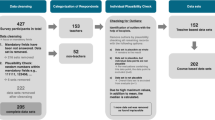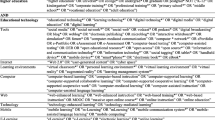Abstract
Replanning is often used to optimize results of an activity in an ever changing world. To address the challenge of preparing future engineers for success, a special course was created for all engineering freshmen of the Faculty of Engineering of the University of Porto, in Portugal. Presented as a case study, this special course underwent a careful replanning as a result of several years of experience in teaching practice alongside with a theoretical deepening in pedagogical and technological issues, under the aegis of the action-research methodology. Within the context of the case study course, the mentioned replanning was also based on a theoretical approach that clearly identifies teaching–learning-assessment methodologies that promote regulation from those that foster emancipation, using a specific instrument: a taxonomy of educational processes. The replanning was designed to globally boost results regarding the educational aims of the course such as furthering freshmen’s integration into work environment and preparing them for success by fostering transversal skills (needed for study and work). Technology is seen as a mean of education enrichment as well as a productivity tool. The introduced innovations include fun-but-educational activities, several types of assessment over time and specific technological tools which were critical for the educational impact/achievement of this course. Success is demonstrated by encouraging feedback from the stakeholders, high students’ classifications and a steady reduction in retention. It is advocated that large portions of the reasoning behind the replanning can be extrapolated to other courses.

(adapted from European Commission 2011)

(adapted from Torres 2013)





Similar content being viewed by others
Notes
As stated in the European Commission reports ICT-skills include Information & Communication Technology Skills and E-Skills, covering three main categories: ICT practitioner skills, ICT user skills and e-Leadership skills.
Pedagogical work modes are introduced and developed by Marcel Lesne (1977).
References
Adams, J., & Morgan, G. (2007). “Second generation” e-learning: Characteristics and design principles for supporting management soft-skills development. International Journal on E-Learning, 6(2), 157–185.
Andretta, S. (2005). From prescribed reading to the excitement or the burden of choice. Aslib Proceedings, 57(2), 181–190. doi:10.1108/00012530510589146.
Borg, S. (2010). Language teacher research engagement. Language Teaching, 43(4), 391–429.
Cain, T., & Milovic, S. (2010). Action research as a tool of professional development of advisers and teachers in Croatia. European Journal of Teacher Education, 33(1), 19–30.
Carr, W., & Kemmis, S. (1986). Becoming critical: Education, knowledge and action research. Oxon: Routledge-Falmer.
Commission of the European Communities. (2005). Recommendation of the European Parliament and of the Council on key competences for lifelong learning. http://www.europarl.europa.eu/meetdocs/2004_2009/documents/com/com_com(2005)0548_/com_com(2005)0548_en.pdf. Accessed 1 Dec 2015.
Cullen, P. (2007). Developing and implementing models of flexible learning. International Journal of Learning, 14(7), 111–118.
De Vries, M. (2009). The developing the field of technology education: An introduction. In A. Jones & M. De Vries (Eds.), International handbook of research and development in technology education (pp. 1–9). Rotterdam: Sense Publishers.
Dewey, J. (1916). Philosophy of education (Problems of men). California: Littlefield, Adams.
Edwards, E., & Burns, A. (2016). Language teacher action research: Achieving sustainability. ELT Journal, 70(1), 6–15.
Estévez-Ayres, I., Alario-Hoyos, C., Pérez-Sanagustín, M., Pardo, A., Crespo-García, R., Leony, D., et al. (2015). A methodology for improving active learning engineering courses with a large number of students and teachers through feedback gathering and iterative refinement. International Journal of Technology and Design Education, 25(3), 387–408.
European Commission. (2011). Transferability of skills across economic sectors: Role and importance for employment at European level. http://vital.new.voced.edu.au/vital/access/manager/Repository/ngv:51660. Accessed 1 Dec 2015.
FEUP. (2005). “Boletim Informativo da FEUP” (in Portuguese) FEUP’s official informational bulletin, 3rd trimester 2005—accessible through https://issuu.com/feup/docs/bi33. Accessed 18 April 2016.
FEUP. (2014). Official sheet “FEUP in Figures”, Year 2014. https://sigarra.up.pt/feup/en/web_base.gera_pagina?p_pagina=21919, FEUP 2014. Accessed 18 April 2016.
FEUP. (2016). FEUP’s institutional site, 2016 http://fe.up.pt. Accessed 18 April 2016.
Flessner, R., & Stuckey, S. (2014). Politics and action research: An examination of one school’s action research program. Action Research, 12(1), 36–51.
Freire, P. (1987). Pedagogia do oprimido. Porto: Edições Afrontamento.
Freire, P. (1997). Pedagogia da autonomia. São Paulo: Paz e Terra.
Gibbs, G., & Simpson, C. (2004). Conditions under which assessment supports students’ learning. Learning and Teaching in Higher Education, 1(1), 3–31.
Hand, L., Sanderson, P., & O’Neil, M. (1996). Fostering deep and active learning through assessment. Accounting Education, 5(1), 103–119.
Kemmis, S., & McTaggart, R. (2005). Participatory action research: Communicative action and the public sphere. In N. K. Denzin & Y. S. Lincoln (Eds.), The sage handbook of qualitative research (pp. 559–603). California: Sage Publications.
Kubo, O., & Botomé, S. (2001). Ensino-aprendizagem: uma interação entre dois processos comportamentais. Interação em Psicologia, 5, 1–19.
Lea, S., Stephenson, D., & Troy, J. (2003). Higher education students’ attitudes to student centred learning: Beyond ‘educational bulimia’. Studies in Higher Education, 28(3), 321–334.
Leon, P. (2004). Time to cut the cables? Times higher educational supplement (pp. 8–9), 30 April.
Lesne, M. (1977). Travail pédagogique et formation d’adultes: éléments d’analyse. Paris: Puf Editions.
Levia, D., & Quiring, S. (2008). Assessment of student learning in a hybrid PBL capstone seminar. Journal of Geography in Higher Education, 32(2), 217–231.
Lickert, R. (1932). A technique for the measurement of attitudes. Archives of Psychology, 140, 1–55.
Livingstone. (2011). Critical reflections on the benefits of ICT in education. Oxford Review of Education, 38(1), 9–24.
Ljungman, A., & Silén, C. (2008). Examination involving students as peer examiners. Assessment and Evaluation in Higher Education, 33(3), 289–300.
Maruyama, G. (1996). Application and transformation of action research in educational research and practice. Systems Practice, 9(1), 85–101.
Mouraz, A., & Sousa, A. (2015). An institutional approach to first-year adjustment: The “Projeto FEUP” case study of a Portuguese University. Journal of Hispanic Higher Education. doi:10.1177/1538192715592928.
Neilsen, E. (2006). But let us not forget John Collier: Commentary on David Bargal’s ‘Personal and intellectual influences leading to Lewin’s paradigm on action research’. Action Research, 4(4), 389–399.
PF. (2015). Projeto FEUP course official fact sheet for year 2014/2015. https://sigarra.up.pt/feup/en/UCURR_GERAL.FICHA_UC_VIEW?pv_ocorrencia_id=353321. Accessed 18 April 2016.
Pundak, D., Herscovitz, O., & Shacham, M. (2010). Attitudes of face-to-face and e-learning instructors toward “Active Learning”. European Journal of Open, Distance and E-Learning, 2, 1–12.
Reddy, Y., & Andrade, H. (2010). A review of rubric use in higher education. Assessment & Evaluation in Higher Education, 35(4), 435–448. doi:10.1080/02602930902862859.
Sadler, R. (2005). Interpretations of criteria-based assessment and grading in higher education. Assessment and Evaluation in Higher Education, 30(2), 175–194.
Sousa, A., & Mouraz, A. (2014). Promoting ‘Soft Skills’ from the start of the engineering degree and the case study of the special ‘Projeto FEUP’ course. International Journal of Engineering Education, 30 (6B), 1539–1548. http://www.ijee.ie/contents/c300614B.html.
Sousa, A., Torres, M., Lopes, C., Ramos, T., & Moreira, L. (2015). Lessons from a B-Learning course in Information Literacy for Engineering Freshmen. In The e-Learning excellence award 2015: An anthology of case histories (pp. 96–113). Academic Conferences and Publishing International Limited.
Torres, M. (2013). Modos de trabalho pedagógico e de avaliação da aprendizagem no ensino superior–um estudo na Universidade do Porto (PhD Thesis). Faculdade de Psicologia e de Ciências da Educação, Universidade do Porto, Porto, Portugal. http://repositorio-aberto.up.pt/handle/10216/67683. Accessed 17 November 2015.
Torres, M. (2014, May). Structured projects for soft skills development: Providing engineering students with international competences. Communication presented in ACE FORUM—Alliance for Cooperation in Engineering—“Fostering international collaboration in the 2020 framework”, Faculdade de Engenharia da Universidade do Porto, Porto, Portugal.
Torres, M., & Leite, C. (2014). Assessment of and for learning in higher education. Transnational Curriculum Inquiry, 11(1), 14–29.
Urs, D. (2013). Soft skills for the engineering students. Synergy, 9(2), 137–142.
Vallenga, D., Grypdonk, M., Hoogwerf, L., & Tan, F. (2009). Action research: What, why and how? Acta Neurologica Belgica, 109(2), 81–90.
Van den Bogaard, M. (2015). Towards an action-oriented model for first year engineering student success. A mixed methods approach (PhD Thesis). Technische Universiteit Delft, Rotterdam, Netherlands. http://repository.tudelft.nl/view/ir/uuid:7e3ea63e-3f28-4f9d-a340-95acc8828763/. Accessed 17 Nov 2015.
Von Glasersfeld, E. (1989). Constructivism in education. In T. Husen & N. Postlewaite (Eds.), International encyclopedia of education (pp. 162–163). Oxford: Pergamon Press.
Acknowledgements
The authors would like to thank the direction of FEUP, Fernanda Torres and all those who believed and were involved in Projeto FEUP, especially Luciano Moreira, Teresa Ramos and Cristina Lopes.
Author information
Authors and Affiliations
Corresponding author
Rights and permissions
About this article
Cite this article
Torres, M.F., Sousa, A.J. & Torres, R.T. Pedagogical and technological replanning: a successful case study on integration and transversal skills for engineering freshmen. Int J Technol Des Educ 28, 573–591 (2018). https://doi.org/10.1007/s10798-017-9399-y
Accepted:
Published:
Issue Date:
DOI: https://doi.org/10.1007/s10798-017-9399-y




